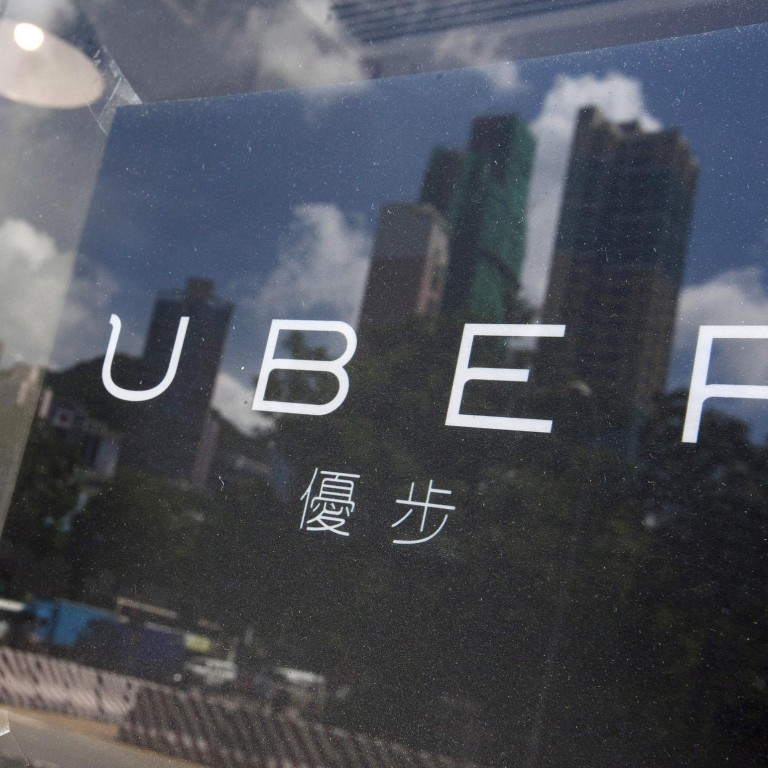
Give taxi licences to private Uber-style drivers, say Hong Kong government advisers
The calls from committee members come as Uber faces police action over app-based service
Two members of the Transport Advisory Committee have come out in favour of giving taxi licences to private drivers, adding to the pressure the government faces in the wake of the controversial police crackdown on global car-hailing app Uber.
The US-based firm, which is facing legal action around the world, is being targeted in Hong Kong as police suspect its drivers operate without a proper licence and insurance. The service has become popular among some Hongkongers as a challenge to "the taxi monopoly".
While the local taxi industry fears a policy change in favour of Uber's drivers or other operators could dampen their business, committee member Terence Chong Tai-leung, who is also an economics professor at Chinese University, asked the government not to take into account their interests.
"There is no obligation for the government to protect licence holders' profitability. All investments come with a risk," he told the .
The opposition from holders of taxi licences is apparently troubling officials. There are more than 18,000 taxis in the city - with about 9,000 taxi-licence holders and about 40,000 drivers.
Chong said: "I personally think [Uber-like services] should be embraced. Technological improvement is unstoppable."
The committee "might discuss the issue" later, he added.
Fellow committee member Wesley Wan Wai-hei said the taxi trade was well-established and competition from private cars would be minimal if the government relaxed the rules.
"Uber is a worldwide company. If other countries can accommodate it, why can't Hong Kong?" said Wan.
Uber is a worldwide company. If other countries can accommodate it, why can't Hong Kong?
He said the number of licences for private car drivers could be controlled so as not to upset the interests of taxi drivers substantially.
Police took unexpected action two weeks ago when they arrested seven Uber drivers and three staff members in a raid on the firm's local office.
One of the core issues is whether passengers would be insured as insurance companies do not cover "illegal activities" - like turning private cars into de facto taxis without a licence - according to the Hong Kong Federation of Insurers.
But the federation added: "If such hiring services were legalised by the government, we as service providers would provide coverage in accordance with ... the appropriate or relevant insurance policies."
Uber, which has gained popularity by offering comfortable cars and credit card payment, which are not available from most traditional taxi companies, claims it has its own insurance policies to cover every passenger who hails a car through its app.
Eliza Chang Lai-shan, a solicitor who also sits on the Law Society's personal injuries committee, called this "theoretically feasible", but added: "It seems the exact terms and conditions are not easily accessible online."
On Friday, the Transport and Housing Bureau issued a lengthy statement explaining its policy on non-taxi car-hailing services, saying it was studying "whether it is feasible and desirable to introduce a premium taxi service" in response to "demand for service variety".
"If the study findings show that taxis are in short supply, the government will consider issuing new taxi licences," the bureau said.
While the role of Uber remains in doubt, the government said private car drivers interested in carrying passengers for commercial purposes could apply for permits from the transport commissioner. The process is criticised as stringent, but the government insists it takes into account the impact on traffic management and demand.
On Saturday, Secretary for Justice Rimsky Yuen Kwok-keung said Uber "could operate under the legal framework", in what is being interpreted as a call for its drivers to get an official licence.
The bureau said it would speed up a review of the taxi trade, which was initially estimated to take up to two years.
The taxi sector is alarmed because any policy changes benefiting non-taxi drivers could force down the value of their licences, currently valued at about HK$7 million each, according to Leung Shiu-cheong, honorary chairman of the Taxi Operators Association.
"Uber may work overseas but it won't in Hong Kong, which already has horrible traffic," said Leung.
If the government reacted swiftly to applications for fare increases, the quality of taxi services could be improved, he added.

